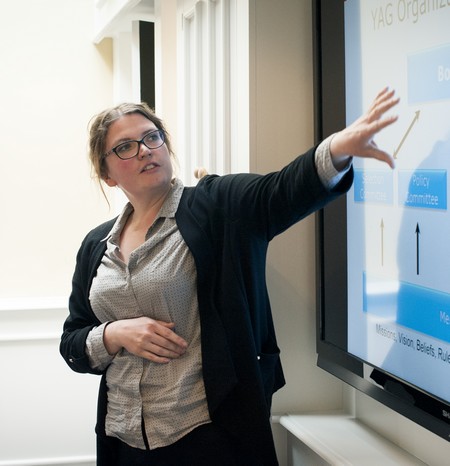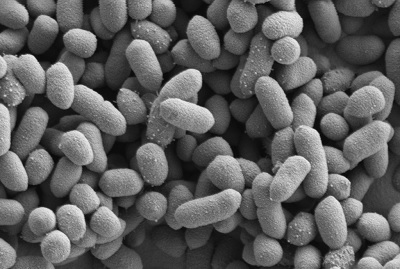Hoe flesvoeding op moedermelk gaat lijken dankzij koolhydraten
RUG-onderzoekers hebben ontdekt hoe een klasse koolhydraten (de galacto-oligosachariden) ervoor zorgt dat flesvoeding de micro-organismen in de darmen net zo stimuleren als gebeurt door moedermelk. De koolhydraten zorgen ervoor dat bij de bacteriën vermogen om zich te voeden met slijm snel wordt aangezet, wat deze cellen helpt te overleven in de darmen. Dankzij deze vinding, die door de universiteit is gepatenteerd, is het mogelijk om zogeheten prebiotica in te zetten om de voedingswaarde van babyvoeding te vergroten. Het onderzoek is op 16 januari gepubliceerd in het tijdschrift Scientific Reports.

Flesvoeding, die doorgaans gemaakt is op basis van koemelk, stimuleert de groei van nuttige bacteriën in de darmen minder goed dan moedermelk. Dit verbetert door een mengsel van moedermelk oligosachariden (humane melk oligosachariden, HMO) aan de flesvoeding toe te voegen, maar deze koolhydraten zijn duur en lastig te maken. Producenten van babyvoeding hebben ontdekt dat er goedkopere koolhydraten zijn, de galactooligosachariden (GOS), die een vergelijkbaar effect hebben. Dit ondanks het feit dat de twee typen koolhydraten een heel verschillende structuur hebben.
Energiebron
‘Waarom die beide mengsels van koolhydraten hetzelfde effect hebben was onbekend. Daarom besloten wij dat uit te zoeken’, zegt Alicia Lammerts van Bueren, eerste auteur van het artikel en ontvanger van een NWO Veni-beurs. Zij gebruikte een darmbacterie, Bacteroides thetaiotaomicron, als modelsysteem. Dit micro-organisme heeft ruim vierhonderd genen voor de afbraak van koolhydraten, waar de mens er maar tien heeft. In de menselijke darm breekt dit soort bacteriën onverteerbare koolhydraten af zodat wij die toch kunnen gebruiken als energiebron.
‘Het genoom van B. thetaiotaomicron is bekend en bevat een groot aantal gen-netwerken die gespecialiseerd zijn in het afbreken van specifieke koolhydraten’, legt Lammerts van Bueren uit. ‘Door te kijken welke netwerken actief zijn kunnen we de bacterie gebruiken om te zien welke reactie verschillende koolhydraten in gang zetten.’
De bacterie werd blootgesteld aan HMO of GOS. Aan de hand van de eiwitten die de bacterie vervolgens ging produceren was het mogelijk te achterhalen welke genetische netwerken actief waren. Hieruit bleek dat beide koolhydraten een netwerk activeerden dat zorgt voor de afbraak van mucine, de glycoproteïnen uit slijm. Alleen GOS activeert daarnaast nog een netwerk dan pectine (een polysacharide dat deels bestaat uit galactose) afbreekt.

Merkwaardig
‘Het lijkt er dus op dat de activatie van het mucine netwerk cruciaal is voor het positieve effect op de micro-organismen in de darm’, zegt Lammerts van Bueren. ‘Wij denken dat zowel HMO als GOS dit mucine netwerk activeren en zo bacteriën helpen te groeien, omdat ze dan het mucine uit darmslijm kunnen gebruiken als voeding.’ De activatie van het mucine netwerk door darmslijm zelf verloopt traag, via de prebiotica gaat dat veel sneller. ‘Op zo’n manier krijgen bacteriën heel snel het vermogen om zich met mucine te voeden.’
Een merkwaardige kant aan de zaak is dat HMO en GOS een totaal verschillende moleculaire structuur hebben en allebei ook verschillen van mucine. ‘Blijkbaar bezitten ze toch bepaalde structurele eigenschappen waardoor ze kunnen binden aan een of andere activator voor het netwerk van mucine-afbrekende genen in deze bacteriën. Maar je had dat niet kunnen voorspellen op basis van de structuurformule van beide koolhydraten.
De onderzoekers hebben achterhaald welke specifieke GOS moleculen verantwoordelijk zijn voor het activeren van het mucine netwerk en hebben patent aangevraagd op dit mengsel en het gebruik ervan. Verschillende producenten van flessenmelk hebben aangegeven belangstelling te hebben voor het werk van Lammerts van Bueren en haar collega’s van de onderzoeksgroep Microbiologie van de RUG.
Referentie: Alicia Lammerts van Bueren, Marieke Mulder, Sander van Leeuwen & Lubbert Dijkhuizen: Prebiotic galactooligosaccharides activate mucin and pectic galactan utilization pathways in the human gut symbiont Bacteroides thetaiotaomicron. Scientific Reports, 16 January 2017, DOI 10.1038/srep40478
Meer nieuws
-
29 januari 2026
Microplasticonderzoek - opgeblazen nieuws of een echt gevaar?
-
27 januari 2026
ERC Proof of Concept grant voor Maria Loi
